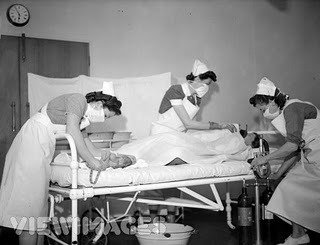Disclaimer: This topic is actually incredibly serious, and way more frightening than fictional vegetarian half-vampire babies with stupid names, so you Twi-hards can stop reading now. Unless you are a Twi-hard interested in birth.
We all know there's arguments out there as to whether or not drugs during labor are safe, but what I want to talk about is more profound.
If you've watched The Business of Being Born, you already know what I'm talking about. If not (or if you forgot), I'm talking about the scariest period in history for pregnant and birthing women … the period of Twilight Sleep.
First, I need to introduce to you two drugs:
- Morphine: The name "morphine" was coined in 1805 by the German pharmacist Adolf Serturner — "morphine" refers to Morpheus, the mythologic god of dreams — to designate the main alkaloid contained in opium. Opium, of course, comes from a plant: the poppy. Morphine is a powerful narcotic agent with strong analgesic action and other significant effects on the central nervous system. It is dangerously addicting.
- Scopolamine: Scopolamine was introduced in 1902 and used up until the 1960s. The name comes from that of the 18th-century Italian naturalist Giovanni Scopoli. Together with atropine, scopolamine is a component of belladonna which comes from a plant called "deadly nightshade," once used as a means of poisoning an enemy. When scopolamine is given in lower (non-poisonous) doses, it causes drowsiness, amnesia, and euphoria (a "high") and was thus used as a pre-anesthetic agent.
So, combine these two drugs, inject it, and what do you get? A woman who went in pregnant and came out with a baby, and doesn't remember anything. You think that doesn't sound too bad? Or at least, not as bad as I'm making it out to be, right?
But it's what happens to the woman during that time that is terrifying.
Because you see, the drugs didn't suppress pain — all they did was create retroactive-memory loss (meaning you don't remember anything that happened) and make you go psychotic. This drug combo was considered the new, BETTER alternative to chloroforming laboring women.
Though throughout history, men often weren't a part of birth as much as they are now, and during this period they weren't allowed in. This remained typical for decades, as shown in movies where the husband paces in the waiting room while his wife is in labor. The reason men weren't allowed in during this period is because they would have never tolerated what happened to their wives:

The drugs they were given made them go insane, so if NOT restrained, __ they would claw out their own eyes__, try to climb walls, try to hurt themselves and the hospital staff because of hallucinations. So OBVIOUSLY, restraints were "necessary." They used lambskin restraints so that their wrists weren't bruised (no signs of restraint was the goal — after all, you don't want women and their husbands wondering what actually happened behind closed doors).
I found an article on Twilight Sleep from 1915 (meaning it existed for the better part of a century) where it is mentioned that the a particular doctor who was one of the leaders in the Twilight Sleep practice would sometimes keep women under the medications for as much as 57 hours at a time.
Here's a quick clip from Ricki Lake's The Business of Being Born that discusses Twilight Sleep (warning: there are bare breasts for a second — skip it if boobs offend you):
Embedded content: https://www.youtube.com/watch?v=tzxs5qPsqX4
One of the major side effects aside from all the trauma to the woman was the fact that this drug often caused nervous system depression in the baby, and often resulted in babies who had respiratory distress — or failure. A baby that can't breathe is a pretty damn serious side affect.
Part of the reason for this medication was a response to immigration around World War I — it was thought that if white women didn't see labor as a scary event, they would have many more children and populate the country with white families, overriding the increasing immigrant numbers.
I feel like I haven't done the terror of this period justice, but fortunately this practice is no longer used. However, one point remains — hospitals always have some new technique, some new thing for labor. Time and time again history has shown that techniques are often used for a period of time and are eventually put to a stop AFTER some serious damage to mothers and children has been done.
Midwives have always existed, and practice much in the same way now as they did a hundred years ago, but their rates have only improved — never declined. Even if you're not comfortable being at home or a birthing center, the risks of drugs that are considered safe can be incredibly extreme. We know there are some potentially serious risks right now, and people in history didn't have the option of that kind of informed consent nor the option to really seek out information of any kind. We do now, and we need to use that ability to really know what we're doing to our bodies — and our babies.
Something that was once the norm is now considered barbaric. I wonder if any common birthing practices we have today will be considered barbaric in the future.
Image via lunadirimmel/Flickr; ctnews.com




